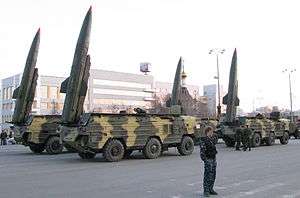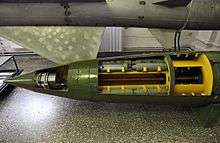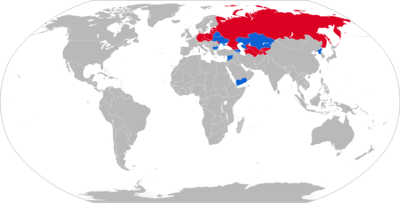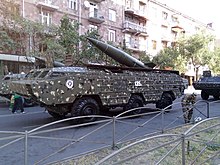OTR-21 Tochka
OTR-21 Tochka (Russian: оперативно-тактический ракетный комплекс (ОТР) «Точка» ("point"); English: Tactical Operational Missile Complex "Tochka") is a Soviet tactical ballistic missile. Its GRAU designation is 9K79; its NATO reporting name is SS-21 Scarab. It is transported in a 9P129 vehicle and raised prior to launch. It uses an inertial guidance system.
| OTR-21 Tochka SS-21 Scarab | |
|---|---|
 Missiles systems Tochka-U at a Russian Federation rehearsal for the parade in Yekaterinburg | |
| Type | Tactical ballistic missile |
| Place of origin | Soviet Union |
| Service history | |
| In service | 1976–present (Scarab A) 1989–present (Scarab B) 1990–present (Scarab C) |
| Used by | See Operators |
| Wars | Yemeni Civil War (1994) First Chechen War Second Chechen War Syrian Civil War War in Donbass Yemeni Civil War (2015–present) Saudi Arabian-led intervention in Yemen |
| Production history | |
| Manufacturer | KBM (Kolomna) |
| Produced | 1973 |
| Specifications | |
| Mass | 2,000 kg (4,400 lb) Scarab A 2,010 kg (4,430 lb) Scarab B 1,800 kg (4,000 lb) Scarab C |
| Length | 6.4 m (21 ft) |
| Diameter | 0.65 m (2 ft 2 in) |
| Warhead | Chemical, 100 kt nuclear warhead, EMP, or fragmentation filling |
| Engine | Single-stage Solid-fuel rocket 96kN[1] |
Operational range | 70 km (43 mi) Scarab A 120 km (75 mi) Scarab B 185 km (115 mi) Scarab C |
| Maximum speed | 1.8 km/s (1.1 mi/s; Mach 5.3) |
Guidance system | Inertial guidance, Tochka-P added passive radar against radar installations |
| Accuracy | 150 m (Scarab A) |
Launch platform | BAZ-5921 Mobile TEL |
The OTR-21 forward deployment to East Germany began in 1981, replacing the earlier Luna-M series of unguided artillery rockets.
Description
The OTR-21 is a mobile missile launch system, designed to be deployed along with other land combat units on the battlefield. While the 9K52 Luna-M is large and relatively inaccurate, the OTR-21 is much smaller. The missile itself can be used for precise strikes on enemy tactical targets, such as control posts, bridges, storage facilities, troop concentrations and airfields. The fragmentation warhead can be replaced with a nuclear, biological or chemical warhead. The solid propellant makes the missile easy to maintain and deploy.
OTR-21 units are usually managed in a brigade structure. There are 18 launchers in a brigade; each launcher is provided with 2 or 3 missiles. The vehicle is completely amphibious, with a maximum road speed of 60 km/h (37 mph) and 8 km/h (5.0 mph) in water. It is NBC-protected. The system has been in development since 1968. Three variants were developed.
Scarab A
The initial Scarab A entered service with the Soviet Army in 1975. It carries one of three types of warhead:
- 482 kg (1,063 lb) of conventional HE
- fragmentation (lethal radius more than 200 m (660 ft)
- nuclear
The minimal range is about 15 km (9.3 mi), maximum range is 70 km (43 mi); its circular error probable (CEP) is estimated to be about 150 m (490 ft).

Scarab B
The improved Scarab B (Tochka-U) passed state tests from 1986 to 1988 and introduced in 1989. Improved propellant increased the range to 120 km (75 mi). CEP significantly improved, to less than 95 m (312 ft).
Scarab C
A third variant, Scarab C, was developed in the 1990s. Again, range increased (185 km (115 mi)), and CEP decreased to less than 70 m (229 ft). Scarab C weighs 1,800 kg (4,000 lb).
Configuration
- 9M79 missiles with various types of warheads (-9M79-1 for Tochika U Complex).
- Launcher 9P129 or 9P129-1M (SPU);
- Transport and loading machine 9T218 or 9T128-1 (TZM);
- Transport vehicle 9T222 or 9T238 (TM);
- Automatic testing machine 9V819 or 9V819-1 (AKIM);
- Technical service vehicle 9V844 or 9V844M (MTO).
- Set of weapon equipment 9F370-1 (KAO);
Educational means
- Simulator 9F625M;
- Missile overall weight model (such as 9M79K-GVM).
- 9M79-UT training missile and 9N123F (K) -UT, 9N39-UT warhead. 9H123F-R UT;
- 9M79-RM missile and 9N123K-RM missile split training model.
Use in combat
- In 1994 the Yemeni government used Tochka missiles against southern forces during the 1994 Yemen civil war.[2]
- In 1999 Russia used the missiles in the Chechen Wars.[3]
- At least 15 Tochka missiles were deployed by Russian forces from 8 to 11 August 2008 during the 2008 South Ossetia war.[4]
- CNN reported that at least one has been used near Donetsk during the War in Donbass by either the Ukrainian army or the Russian-backed separatist forces. The Ukrainian army issued a statement in which they denied the use of the ballistic missile.[5][6][7]
- In early December 2014, the Syrian Army fired at least one Tochka against Syrian rebels during the Siege of Wadi al-Deif (near Maarat al-Numan, in Idlib province) .[8]
- On 20 August 2015, during the Saudi Arabian-led intervention in Yemen, Republican Guard (Yemen) loyal to Ali Abdullah Saleh fired a Tochka targeting a Saudi base.[9]
- On 4 September 2015 Houthi forces fired a Tochka missile at Safir base in Marib killing over 100 Saudi-led coalition personnel.[10][11][12]
- On 14 December 2015 Houthi forces fired another Tochka missile at Bab Al Mandab base killing over 150 Saudi-led coalition personnel stationed there.[13][14][15]
- On 16 January 2016 Houthi forces fired a Tochka at Al Bairaq base in Marib killing dozens of Saudi-led coalition personnel [16][17]
- On 31 January 2016 Houthi forces fired a Tochka at Al Anad base in Lahj killing and wounding over 200 Saudi-led coalition personnel[18][19][20][21]
- On 26 April 2016 the Syrian Army fired a Tochka at Syrian rebels in the Syrian Civil Defense Center in west Aleppo[22]
- On 14 June 2016 the Syrian Army fired a Tochka at Syrian rebel groups Al-Rahman Legion and Jaysh Al-Fustat in Eastern Ghouta, killing several fighters.[23]
- On 20 March 2018 the Syrian Army fired a Tochka towards the Turkish Hatay province, which fell in the border district of Yayladağı without causing any casualties or damage.[24][25]
- On 23 July 2018 Syrian Army fired two Tochka missiles near the Israeli border. Initially thought to be inbound to Israel near the Sea of Galilee, two David's Sling interceptors were fired by Israel. A few moments later it became clear they were going to strike within Syria, as such one interceptor was detonated over Israel while the other one fell inside Syria.[26] One Tochka missile landed 1 kilometer inside Syria.[27]
Operators

Current operators

- At least 40 launchers Tochka

- 3 Tochka launchers with 4 missiles

- 36[28]

- 18[29]

- unknown number

- unknown number of variant Hwasong-11

- 220 launchers.[30] Missile systems have been upgraded since 2004 (replacing the onboard automated control systems)[31][32] and are scheduled to be replaced by the 9K720 Iskander missiles[33][34] by 2020.[35]

- 90[36]

- unknown number

- large numbers
Former operators

- Passed on to successor states.

- Inherited from Czechoslovakia, retired.

- Passed on to Germany.

- Retired.

- 4[37] retired in 2005, because of lack of rockets and service parts

- North Yemen Ordered a number of scarab missiles and launchers and used them during the 1994 civil war and were passed on to unified Yemen after. Have seen action during the ongoing civil war.

- a small number, inherited from Czechoslovakia, all retired.

- Passed on to successor states.
Comparable missiles
References
- http://www.b14643.de/Spacerockets/Specials/RT-Missiles/index.htm#9M79 Archived 2017-11-07 at the Wayback Machine & 9M79M (Totchka)
- Zaloga, Steven J. Scud Ballistic Missile and Launch Systems 1955-2005, page 39.
- "It Was No Spontaneous, But Planned War". Novaya Gazeta. Archived from the original on 2008-09-30.
- Fulghum, David A.; Douglas Barrie; Robert Wall; Andy Nativi (2008-08-15). "Georgian Military Folds Under Russian Attack". Aviation Week. Archived from the original on 2011-05-21. Retrieved 2008-11-09.
- "Ukraine denies using ballistic missiles". Deutsche Welle. 2 August 2014. Archived from the original on 6 October 2014. Retrieved 2 October 2014.
- "NATO flip-flops over Kiev use of ballistic missiles against militants". RT. 1 August 2014. Archived from the original on 6 October 2014. Retrieved 2 October 2014.
- Tim Lister (3 September 2014). "Wrecked tanks, deserted playgrounds: Inside the kill zone of eastern Ukraine". CNN. Archived from the original on 6 October 2014. Retrieved 2 October 2014.
In a burned field south of Ilovaisk, on what was the frontline of combat a few days ago, we found a large green tube amid bushes and trees. Military experts have identified it as the rocket motor section of a Russian-made SS-21 "Scarab" ballistic missile. But both the Ukrainian and Russian militaries have the SS-21.
- "( + ) -". 2014-12-15. Archived from the original on 2014-12-17. Retrieved 2014-12-23.
- "Oryx Blog: Houthis continue to fire ballistic missiles at Saudi Arabia". Spioenkop.blogspot.fr. 2015-08-20. Archived from the original on 2016-10-27. Retrieved 2017-03-02.
- "Toll From Yemen Rebel Attack Rises as 10 Saudi Troops Killed". Archived from the original on 2015-09-13. Retrieved 2015-09-05.
- "UAE soldier deaths in Yemen rise to 52". Al Bawaba. Archived from the original on 2017-09-04. Retrieved 2017-03-02.
- "TSG IntelBrief: The Endless Fight for Yemen". The Soufan Group. Archived from the original on 2017-06-14. Retrieved 2017-03-02.
- Gould, Joe (2015-12-14). "united-arab-emirates". Defensenews.com. Retrieved 2017-03-02.
- "Yemen conflict: Gulf commanders 'killed in missile strike'". BBC News. 2015-12-14. Archived from the original on 2017-04-22. Retrieved 2017-03-02.
- "Cease-fire in Yemen Ushers In Talks to End War". Wall Street Journal. 2015-12-14. Archived from the original on 2017-06-13. Retrieved 2017-03-02.
- ""توشكا" جديد يقصم ظهر "التحالف" | الأخبار". Al-akhbar.com. Archived from the original on 2017-05-29. Retrieved 2017-03-02.
- "Dozens of Saudi-led Forces Killed in Yemen New Tochka Attack- Al Manar TV Website Archive". Almanar.com.lb. 2016-01-18. Archived from the original on 2016-01-27. Retrieved 2017-03-02.
- Leith Fadel. "Over 200 Saudi-led Coalition fighters killed in Tochka missile strike". Al-Masdar News. Archived from the original on 2016-11-18. Retrieved 2017-03-02.
- "Yemen's Tochka Attack Kills Blackwater Commander, Saudi Mercenaries- Al Manar TV Website Archive". Almanar.com.lb. 2016-01-31. Archived from the original on 2016-02-13. Retrieved 2017-03-02.
- "Defense Digest on Twitter: "Updated #Tochka strike damage in Al Anad in #Yemen, 120 Sudanese dead out of the 145 killed & more than 250 injured"". postskriptum.org.com. Retrieved 2019-08-22.
- Leith Fadel. "Over 200 Saudi-led Coalition fighters killed in Tochka missile strike". Al-Masdar News. Archived from the original on 2016-11-18. Retrieved 2017-03-02.
- "Tochka-U fired by regime in West Aleppo". Map of Syrian Civil war/ Global conflict in Syria - liveuamap.com. Archived from the original on 2016-05-30. Retrieved 2016-04-27.
- Fadel, Leith (16 June 2016). "Islamist offensive in the East Ghouta turns disastrous". Al Masdar News. Archived from the original on 7 August 2016. Retrieved 16 June 2016.
- "Archived copy". Archived from the original on 2018-03-20. Retrieved 2018-03-20.CS1 maint: archived copy as title (link)
- "Archived copy". Archived from the original on 2019-02-25. Retrieved 2019-02-25.CS1 maint: archived copy as title (link)
- "Second David's Sling-missile fell in Syria without hitting target", The Jerusalem Post, 25 July 2018
- "Archived copy". Archived from the original on 2018-07-23. Retrieved 2018-07-23.CS1 maint: archived copy as title (link)
- "Belarus Army Equipment". Archived from the original on 2017-02-16. Retrieved 2007-11-06.
- Milev, Momchil (2014-04-11). "Da izkovem ot plugovete mechove". Economedia. p. 2. Archived from the original on 17 April 2014. Retrieved 9 August 2014.
- "Archived copy". Archived from the original on 2014-12-13. Retrieved 2015-01-15.CS1 maint: archived copy as title (link)
- "24.02.12 СМИ: Минобороны отказалось ремонтировать тактические ракеты "Точка-У"". militaryparitet.com. 24 February 2012. Archived from the original on 11 December 2014. Retrieved 23 December 2014.
- The Military Balance 2010. P. 223.
- "Великий воин и защитник "Искандер"". vpk.name. Archived from the original on 10 December 2014. Retrieved 23 December 2014.
- Денис Тельманов. "Сухопутные войска теряют тактические ракеты". Известия. Archived from the original on 14 December 2014. Retrieved 23 December 2014.
- Artillery units of Russia will replace Tochka-U tactical missile with Iskander-M Archived 2017-09-14 at the Wayback Machine - Armyrecognition.com, 28 November 2016
- "Ground Forces Equipment - Ukraine". Archived from the original on 2017-07-07. Retrieved 2007-09-13.
- MILITARIUM - Wojsko Polskie - Uzbrojenie Archived 2013-08-26 at the Wayback Machine
External links
| Wikimedia Commons has media related to OTR-21 Tochka. |
